Healthcare Priorities: Discussion and Critical Appraisal Report
VerifiedAdded on 2022/12/26
|8
|1847
|64
Report
AI Summary
This report begins with a discussion of key healthcare priorities identified by the National Institute of Nursing Research, including wellness, self-management, symptom science, and end-of-life care. The report emphasizes the importance of symptom management, particularly for the elderly, and the role of self-management in chronic illness treatment. Wellness is defined as a state of being, and end-of-life care encompasses symptom and pain management. The report then critically appraises a research paper by Selman et al. (2014) on research priorities in spiritual care within palliative care, discussing the study's methodology, data analysis, and findings. The study, conducted internationally, aimed to identify research priorities among clinicians and researchers. The appraisal highlights the study's strengths and limitations, including the potential for bias and the identification of research gaps. The report concludes by summarizing the study's contributions to understanding spiritual care in palliative settings.
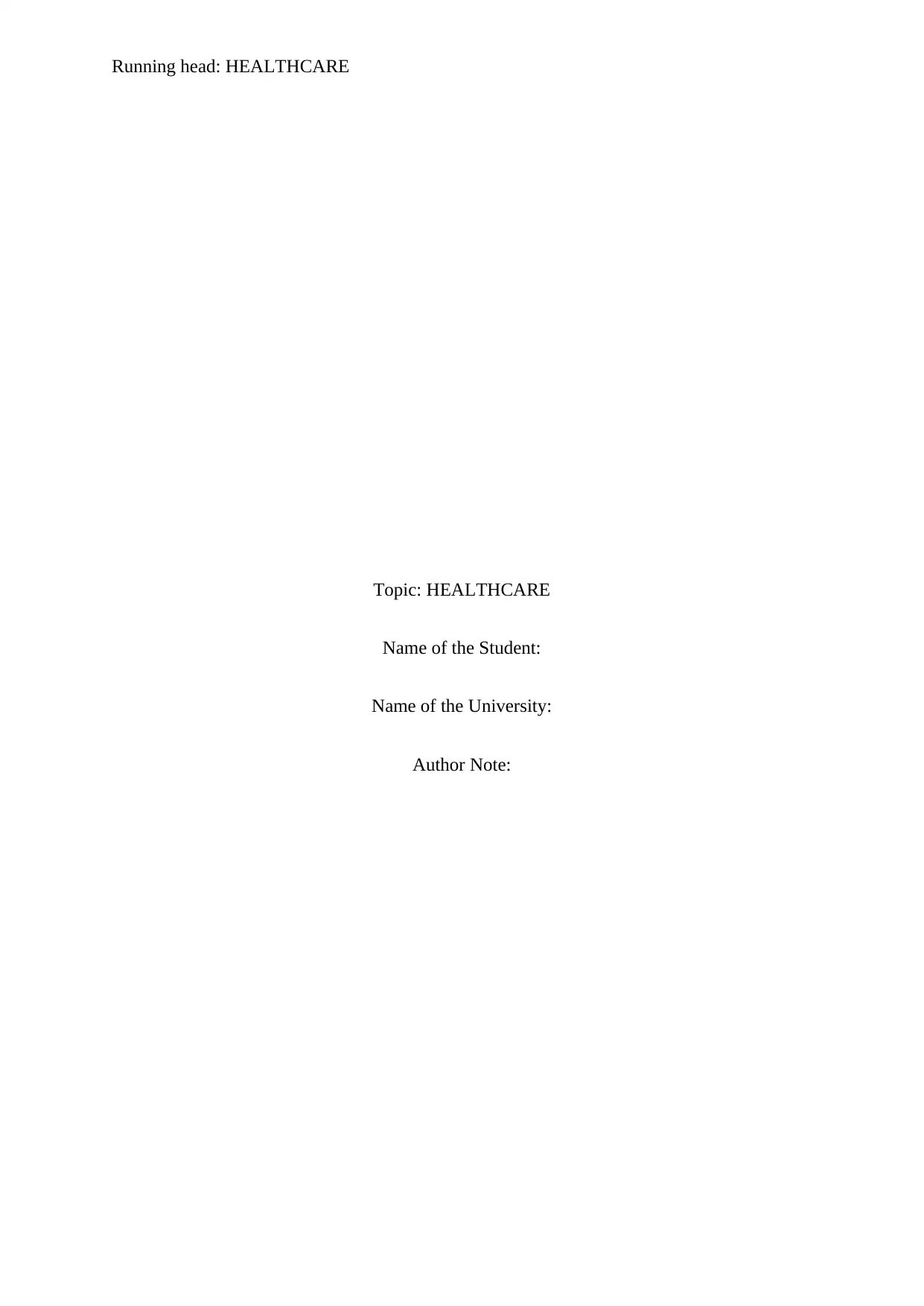
Running head: HEALTHCARE
Topic: HEALTHCARE
Name of the Student:
Name of the University:
Author Note:
Topic: HEALTHCARE
Name of the Student:
Name of the University:
Author Note:
Paraphrase This Document
Need a fresh take? Get an instant paraphrase of this document with our AI Paraphraser
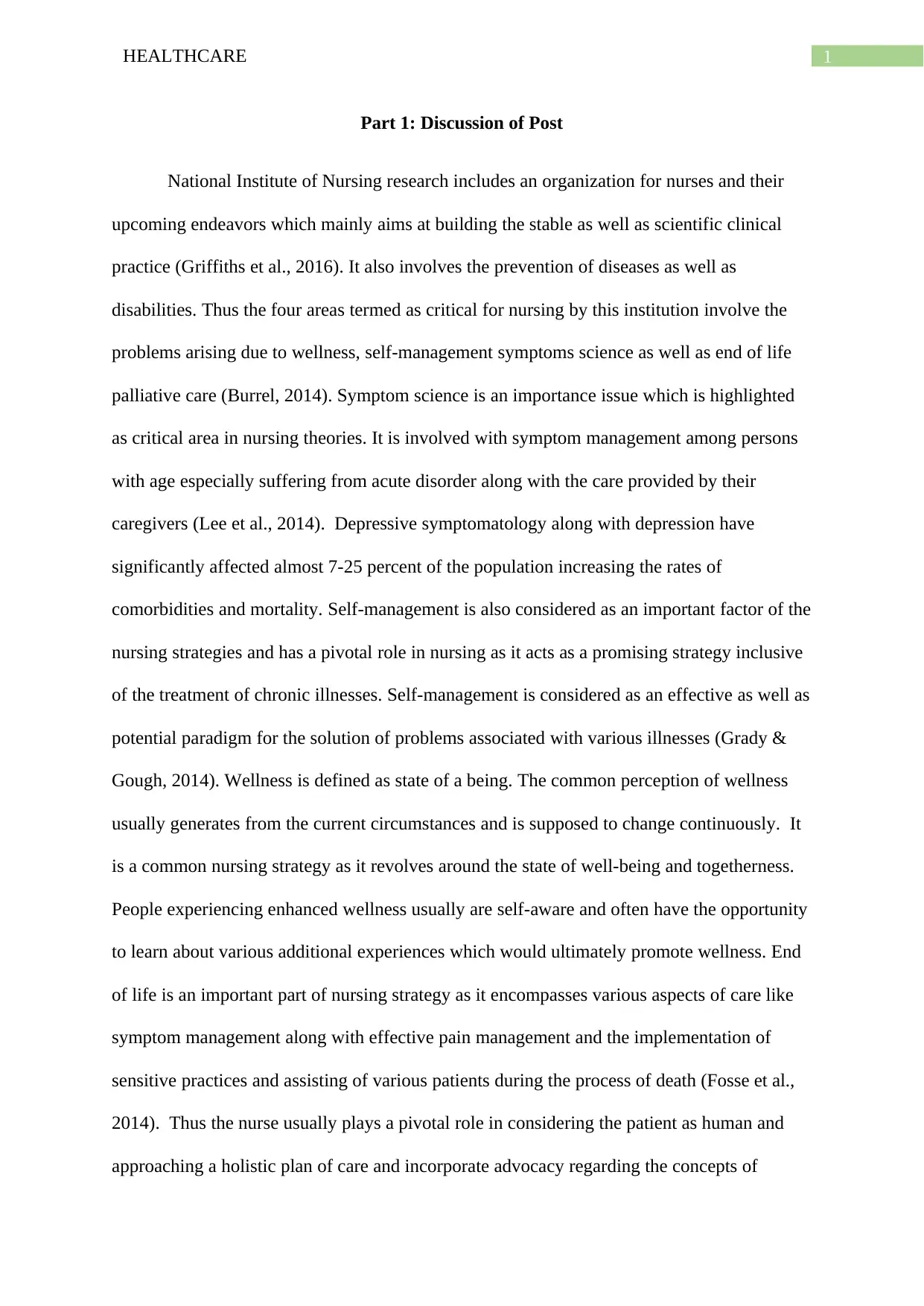
1HEALTHCARE
Part 1: Discussion of Post
National Institute of Nursing research includes an organization for nurses and their
upcoming endeavors which mainly aims at building the stable as well as scientific clinical
practice (Griffiths et al., 2016). It also involves the prevention of diseases as well as
disabilities. Thus the four areas termed as critical for nursing by this institution involve the
problems arising due to wellness, self-management symptoms science as well as end of life
palliative care (Burrel, 2014). Symptom science is an importance issue which is highlighted
as critical area in nursing theories. It is involved with symptom management among persons
with age especially suffering from acute disorder along with the care provided by their
caregivers (Lee et al., 2014). Depressive symptomatology along with depression have
significantly affected almost 7-25 percent of the population increasing the rates of
comorbidities and mortality. Self-management is also considered as an important factor of the
nursing strategies and has a pivotal role in nursing as it acts as a promising strategy inclusive
of the treatment of chronic illnesses. Self-management is considered as an effective as well as
potential paradigm for the solution of problems associated with various illnesses (Grady &
Gough, 2014). Wellness is defined as state of a being. The common perception of wellness
usually generates from the current circumstances and is supposed to change continuously. It
is a common nursing strategy as it revolves around the state of well-being and togetherness.
People experiencing enhanced wellness usually are self-aware and often have the opportunity
to learn about various additional experiences which would ultimately promote wellness. End
of life is an important part of nursing strategy as it encompasses various aspects of care like
symptom management along with effective pain management and the implementation of
sensitive practices and assisting of various patients during the process of death (Fosse et al.,
2014). Thus the nurse usually plays a pivotal role in considering the patient as human and
approaching a holistic plan of care and incorporate advocacy regarding the concepts of
Part 1: Discussion of Post
National Institute of Nursing research includes an organization for nurses and their
upcoming endeavors which mainly aims at building the stable as well as scientific clinical
practice (Griffiths et al., 2016). It also involves the prevention of diseases as well as
disabilities. Thus the four areas termed as critical for nursing by this institution involve the
problems arising due to wellness, self-management symptoms science as well as end of life
palliative care (Burrel, 2014). Symptom science is an importance issue which is highlighted
as critical area in nursing theories. It is involved with symptom management among persons
with age especially suffering from acute disorder along with the care provided by their
caregivers (Lee et al., 2014). Depressive symptomatology along with depression have
significantly affected almost 7-25 percent of the population increasing the rates of
comorbidities and mortality. Self-management is also considered as an important factor of the
nursing strategies and has a pivotal role in nursing as it acts as a promising strategy inclusive
of the treatment of chronic illnesses. Self-management is considered as an effective as well as
potential paradigm for the solution of problems associated with various illnesses (Grady &
Gough, 2014). Wellness is defined as state of a being. The common perception of wellness
usually generates from the current circumstances and is supposed to change continuously. It
is a common nursing strategy as it revolves around the state of well-being and togetherness.
People experiencing enhanced wellness usually are self-aware and often have the opportunity
to learn about various additional experiences which would ultimately promote wellness. End
of life is an important part of nursing strategy as it encompasses various aspects of care like
symptom management along with effective pain management and the implementation of
sensitive practices and assisting of various patients during the process of death (Fosse et al.,
2014). Thus the nurse usually plays a pivotal role in considering the patient as human and
approaching a holistic plan of care and incorporate advocacy regarding the concepts of
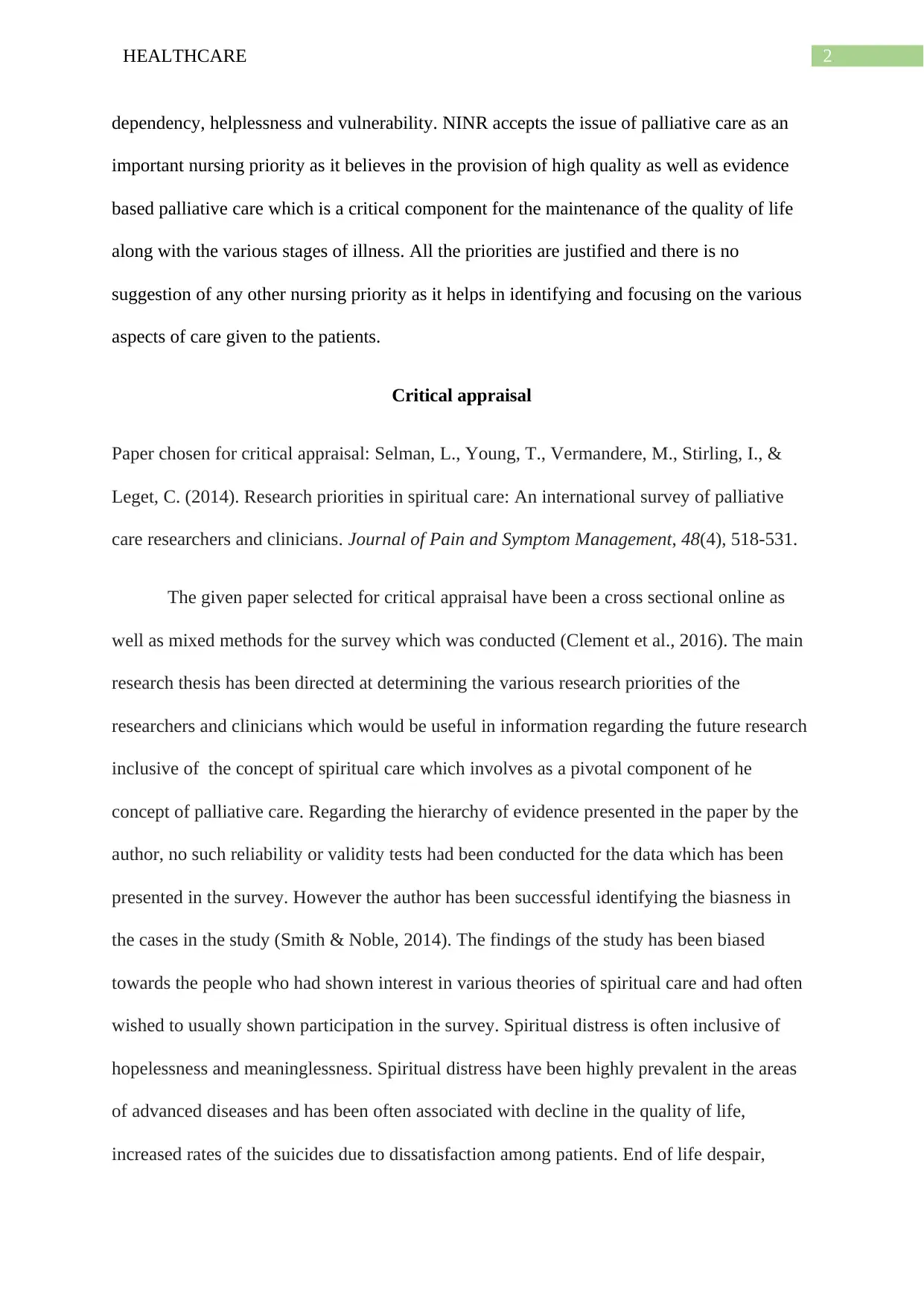
2HEALTHCARE
dependency, helplessness and vulnerability. NINR accepts the issue of palliative care as an
important nursing priority as it believes in the provision of high quality as well as evidence
based palliative care which is a critical component for the maintenance of the quality of life
along with the various stages of illness. All the priorities are justified and there is no
suggestion of any other nursing priority as it helps in identifying and focusing on the various
aspects of care given to the patients.
Critical appraisal
Paper chosen for critical appraisal: Selman, L., Young, T., Vermandere, M., Stirling, I., &
Leget, C. (2014). Research priorities in spiritual care: An international survey of palliative
care researchers and clinicians. Journal of Pain and Symptom Management, 48(4), 518-531.
The given paper selected for critical appraisal have been a cross sectional online as
well as mixed methods for the survey which was conducted (Clement et al., 2016). The main
research thesis has been directed at determining the various research priorities of the
researchers and clinicians which would be useful in information regarding the future research
inclusive of the concept of spiritual care which involves as a pivotal component of he
concept of palliative care. Regarding the hierarchy of evidence presented in the paper by the
author, no such reliability or validity tests had been conducted for the data which has been
presented in the survey. However the author has been successful identifying the biasness in
the cases in the study (Smith & Noble, 2014). The findings of the study has been biased
towards the people who had shown interest in various theories of spiritual care and had often
wished to usually shown participation in the survey. Spiritual distress is often inclusive of
hopelessness and meaninglessness. Spiritual distress have been highly prevalent in the areas
of advanced diseases and has been often associated with decline in the quality of life,
increased rates of the suicides due to dissatisfaction among patients. End of life despair,
dependency, helplessness and vulnerability. NINR accepts the issue of palliative care as an
important nursing priority as it believes in the provision of high quality as well as evidence
based palliative care which is a critical component for the maintenance of the quality of life
along with the various stages of illness. All the priorities are justified and there is no
suggestion of any other nursing priority as it helps in identifying and focusing on the various
aspects of care given to the patients.
Critical appraisal
Paper chosen for critical appraisal: Selman, L., Young, T., Vermandere, M., Stirling, I., &
Leget, C. (2014). Research priorities in spiritual care: An international survey of palliative
care researchers and clinicians. Journal of Pain and Symptom Management, 48(4), 518-531.
The given paper selected for critical appraisal have been a cross sectional online as
well as mixed methods for the survey which was conducted (Clement et al., 2016). The main
research thesis has been directed at determining the various research priorities of the
researchers and clinicians which would be useful in information regarding the future research
inclusive of the concept of spiritual care which involves as a pivotal component of he
concept of palliative care. Regarding the hierarchy of evidence presented in the paper by the
author, no such reliability or validity tests had been conducted for the data which has been
presented in the survey. However the author has been successful identifying the biasness in
the cases in the study (Smith & Noble, 2014). The findings of the study has been biased
towards the people who had shown interest in various theories of spiritual care and had often
wished to usually shown participation in the survey. Spiritual distress is often inclusive of
hopelessness and meaninglessness. Spiritual distress have been highly prevalent in the areas
of advanced diseases and has been often associated with decline in the quality of life,
increased rates of the suicides due to dissatisfaction among patients. End of life despair,
⊘ This is a preview!⊘
Do you want full access?
Subscribe today to unlock all pages.

Trusted by 1+ million students worldwide
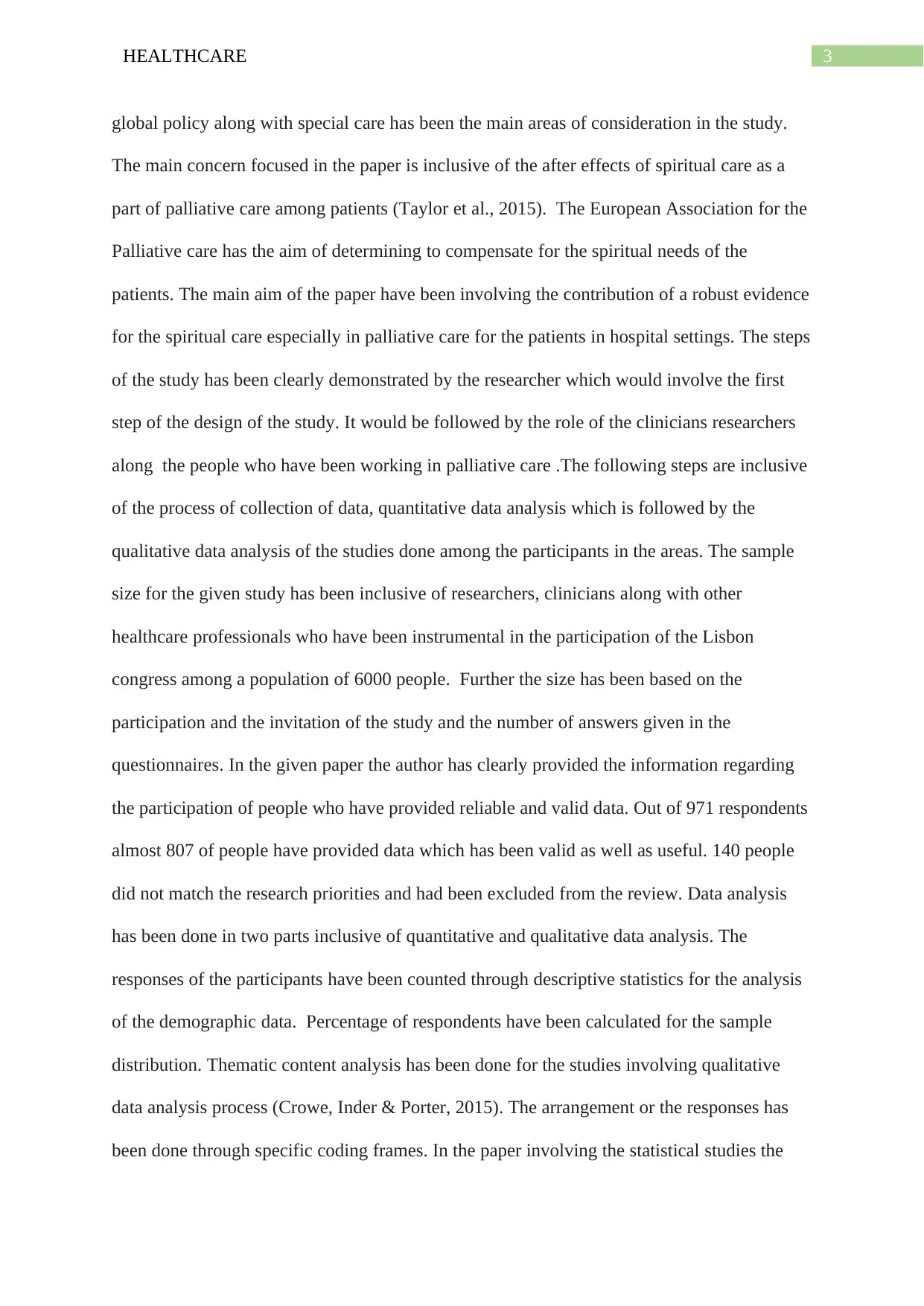
3HEALTHCARE
global policy along with special care has been the main areas of consideration in the study.
The main concern focused in the paper is inclusive of the after effects of spiritual care as a
part of palliative care among patients (Taylor et al., 2015). The European Association for the
Palliative care has the aim of determining to compensate for the spiritual needs of the
patients. The main aim of the paper have been involving the contribution of a robust evidence
for the spiritual care especially in palliative care for the patients in hospital settings. The steps
of the study has been clearly demonstrated by the researcher which would involve the first
step of the design of the study. It would be followed by the role of the clinicians researchers
along the people who have been working in palliative care .The following steps are inclusive
of the process of collection of data, quantitative data analysis which is followed by the
qualitative data analysis of the studies done among the participants in the areas. The sample
size for the given study has been inclusive of researchers, clinicians along with other
healthcare professionals who have been instrumental in the participation of the Lisbon
congress among a population of 6000 people. Further the size has been based on the
participation and the invitation of the study and the number of answers given in the
questionnaires. In the given paper the author has clearly provided the information regarding
the participation of people who have provided reliable and valid data. Out of 971 respondents
almost 807 of people have provided data which has been valid as well as useful. 140 people
did not match the research priorities and had been excluded from the review. Data analysis
has been done in two parts inclusive of quantitative and qualitative data analysis. The
responses of the participants have been counted through descriptive statistics for the analysis
of the demographic data. Percentage of respondents have been calculated for the sample
distribution. Thematic content analysis has been done for the studies involving qualitative
data analysis process (Crowe, Inder & Porter, 2015). The arrangement or the responses has
been done through specific coding frames. In the paper involving the statistical studies the
global policy along with special care has been the main areas of consideration in the study.
The main concern focused in the paper is inclusive of the after effects of spiritual care as a
part of palliative care among patients (Taylor et al., 2015). The European Association for the
Palliative care has the aim of determining to compensate for the spiritual needs of the
patients. The main aim of the paper have been involving the contribution of a robust evidence
for the spiritual care especially in palliative care for the patients in hospital settings. The steps
of the study has been clearly demonstrated by the researcher which would involve the first
step of the design of the study. It would be followed by the role of the clinicians researchers
along the people who have been working in palliative care .The following steps are inclusive
of the process of collection of data, quantitative data analysis which is followed by the
qualitative data analysis of the studies done among the participants in the areas. The sample
size for the given study has been inclusive of researchers, clinicians along with other
healthcare professionals who have been instrumental in the participation of the Lisbon
congress among a population of 6000 people. Further the size has been based on the
participation and the invitation of the study and the number of answers given in the
questionnaires. In the given paper the author has clearly provided the information regarding
the participation of people who have provided reliable and valid data. Out of 971 respondents
almost 807 of people have provided data which has been valid as well as useful. 140 people
did not match the research priorities and had been excluded from the review. Data analysis
has been done in two parts inclusive of quantitative and qualitative data analysis. The
responses of the participants have been counted through descriptive statistics for the analysis
of the demographic data. Percentage of respondents have been calculated for the sample
distribution. Thematic content analysis has been done for the studies involving qualitative
data analysis process (Crowe, Inder & Porter, 2015). The arrangement or the responses has
been done through specific coding frames. In the paper involving the statistical studies the
Paraphrase This Document
Need a fresh take? Get an instant paraphrase of this document with our AI Paraphraser
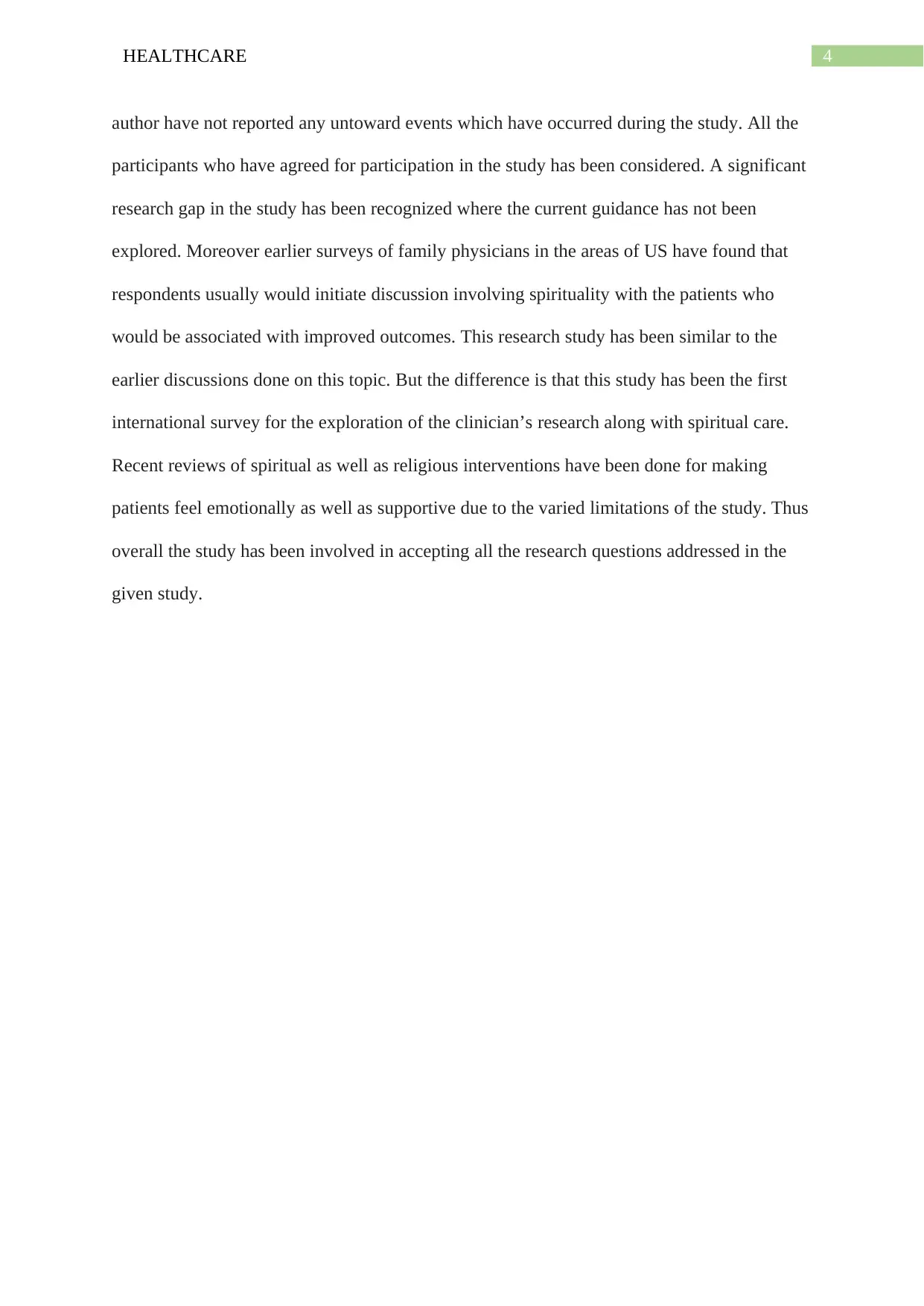
4HEALTHCARE
author have not reported any untoward events which have occurred during the study. All the
participants who have agreed for participation in the study has been considered. A significant
research gap in the study has been recognized where the current guidance has not been
explored. Moreover earlier surveys of family physicians in the areas of US have found that
respondents usually would initiate discussion involving spirituality with the patients who
would be associated with improved outcomes. This research study has been similar to the
earlier discussions done on this topic. But the difference is that this study has been the first
international survey for the exploration of the clinician’s research along with spiritual care.
Recent reviews of spiritual as well as religious interventions have been done for making
patients feel emotionally as well as supportive due to the varied limitations of the study. Thus
overall the study has been involved in accepting all the research questions addressed in the
given study.
author have not reported any untoward events which have occurred during the study. All the
participants who have agreed for participation in the study has been considered. A significant
research gap in the study has been recognized where the current guidance has not been
explored. Moreover earlier surveys of family physicians in the areas of US have found that
respondents usually would initiate discussion involving spirituality with the patients who
would be associated with improved outcomes. This research study has been similar to the
earlier discussions done on this topic. But the difference is that this study has been the first
international survey for the exploration of the clinician’s research along with spiritual care.
Recent reviews of spiritual as well as religious interventions have been done for making
patients feel emotionally as well as supportive due to the varied limitations of the study. Thus
overall the study has been involved in accepting all the research questions addressed in the
given study.
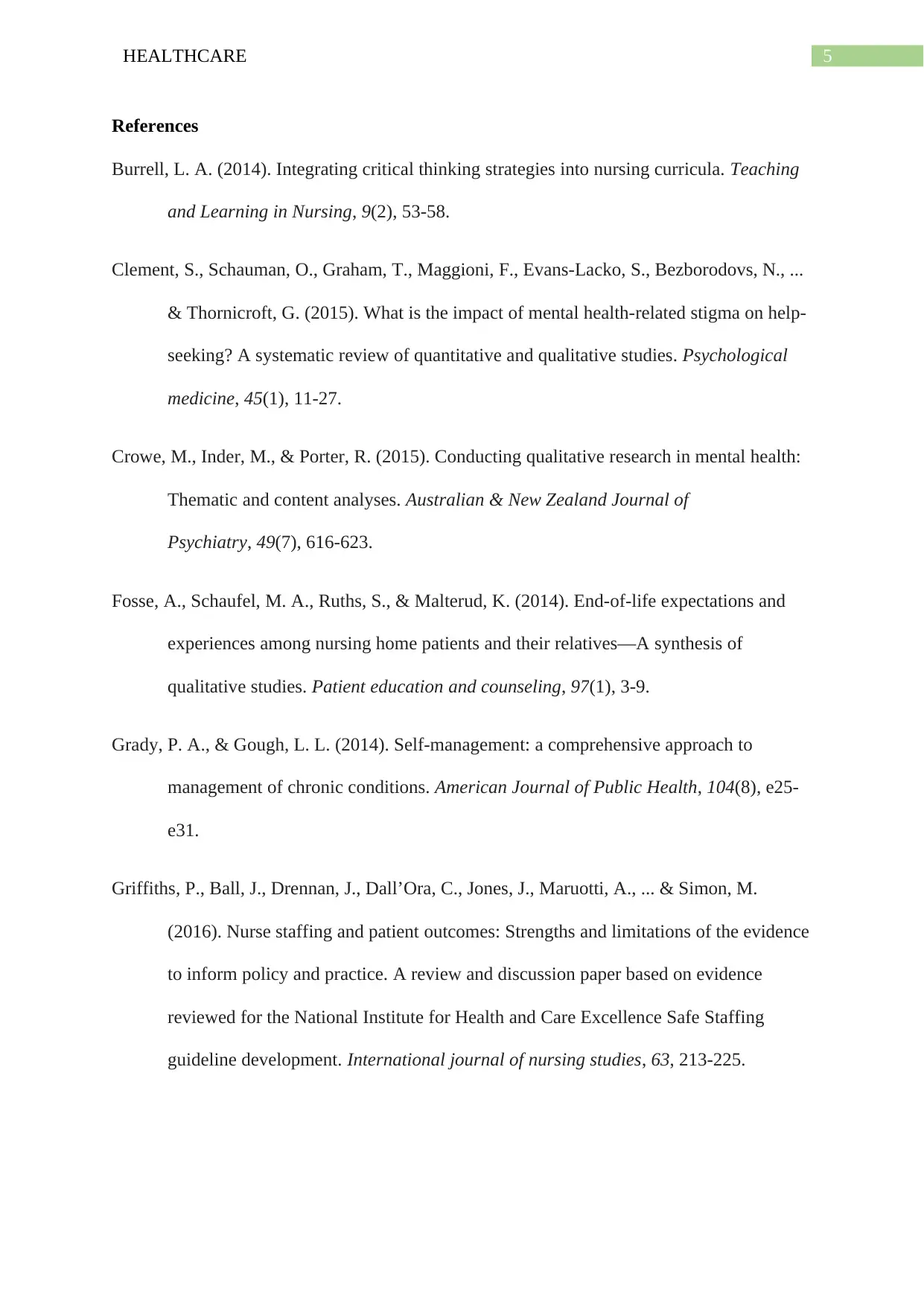
5HEALTHCARE
References
Burrell, L. A. (2014). Integrating critical thinking strategies into nursing curricula. Teaching
and Learning in Nursing, 9(2), 53-58.
Clement, S., Schauman, O., Graham, T., Maggioni, F., Evans-Lacko, S., Bezborodovs, N., ...
& Thornicroft, G. (2015). What is the impact of mental health-related stigma on help-
seeking? A systematic review of quantitative and qualitative studies. Psychological
medicine, 45(1), 11-27.
Crowe, M., Inder, M., & Porter, R. (2015). Conducting qualitative research in mental health:
Thematic and content analyses. Australian & New Zealand Journal of
Psychiatry, 49(7), 616-623.
Fosse, A., Schaufel, M. A., Ruths, S., & Malterud, K. (2014). End-of-life expectations and
experiences among nursing home patients and their relatives—A synthesis of
qualitative studies. Patient education and counseling, 97(1), 3-9.
Grady, P. A., & Gough, L. L. (2014). Self-management: a comprehensive approach to
management of chronic conditions. American Journal of Public Health, 104(8), e25-
e31.
Griffiths, P., Ball, J., Drennan, J., Dall’Ora, C., Jones, J., Maruotti, A., ... & Simon, M.
(2016). Nurse staffing and patient outcomes: Strengths and limitations of the evidence
to inform policy and practice. A review and discussion paper based on evidence
reviewed for the National Institute for Health and Care Excellence Safe Staffing
guideline development. International journal of nursing studies, 63, 213-225.
References
Burrell, L. A. (2014). Integrating critical thinking strategies into nursing curricula. Teaching
and Learning in Nursing, 9(2), 53-58.
Clement, S., Schauman, O., Graham, T., Maggioni, F., Evans-Lacko, S., Bezborodovs, N., ...
& Thornicroft, G. (2015). What is the impact of mental health-related stigma on help-
seeking? A systematic review of quantitative and qualitative studies. Psychological
medicine, 45(1), 11-27.
Crowe, M., Inder, M., & Porter, R. (2015). Conducting qualitative research in mental health:
Thematic and content analyses. Australian & New Zealand Journal of
Psychiatry, 49(7), 616-623.
Fosse, A., Schaufel, M. A., Ruths, S., & Malterud, K. (2014). End-of-life expectations and
experiences among nursing home patients and their relatives—A synthesis of
qualitative studies. Patient education and counseling, 97(1), 3-9.
Grady, P. A., & Gough, L. L. (2014). Self-management: a comprehensive approach to
management of chronic conditions. American Journal of Public Health, 104(8), e25-
e31.
Griffiths, P., Ball, J., Drennan, J., Dall’Ora, C., Jones, J., Maruotti, A., ... & Simon, M.
(2016). Nurse staffing and patient outcomes: Strengths and limitations of the evidence
to inform policy and practice. A review and discussion paper based on evidence
reviewed for the National Institute for Health and Care Excellence Safe Staffing
guideline development. International journal of nursing studies, 63, 213-225.
⊘ This is a preview!⊘
Do you want full access?
Subscribe today to unlock all pages.

Trusted by 1+ million students worldwide
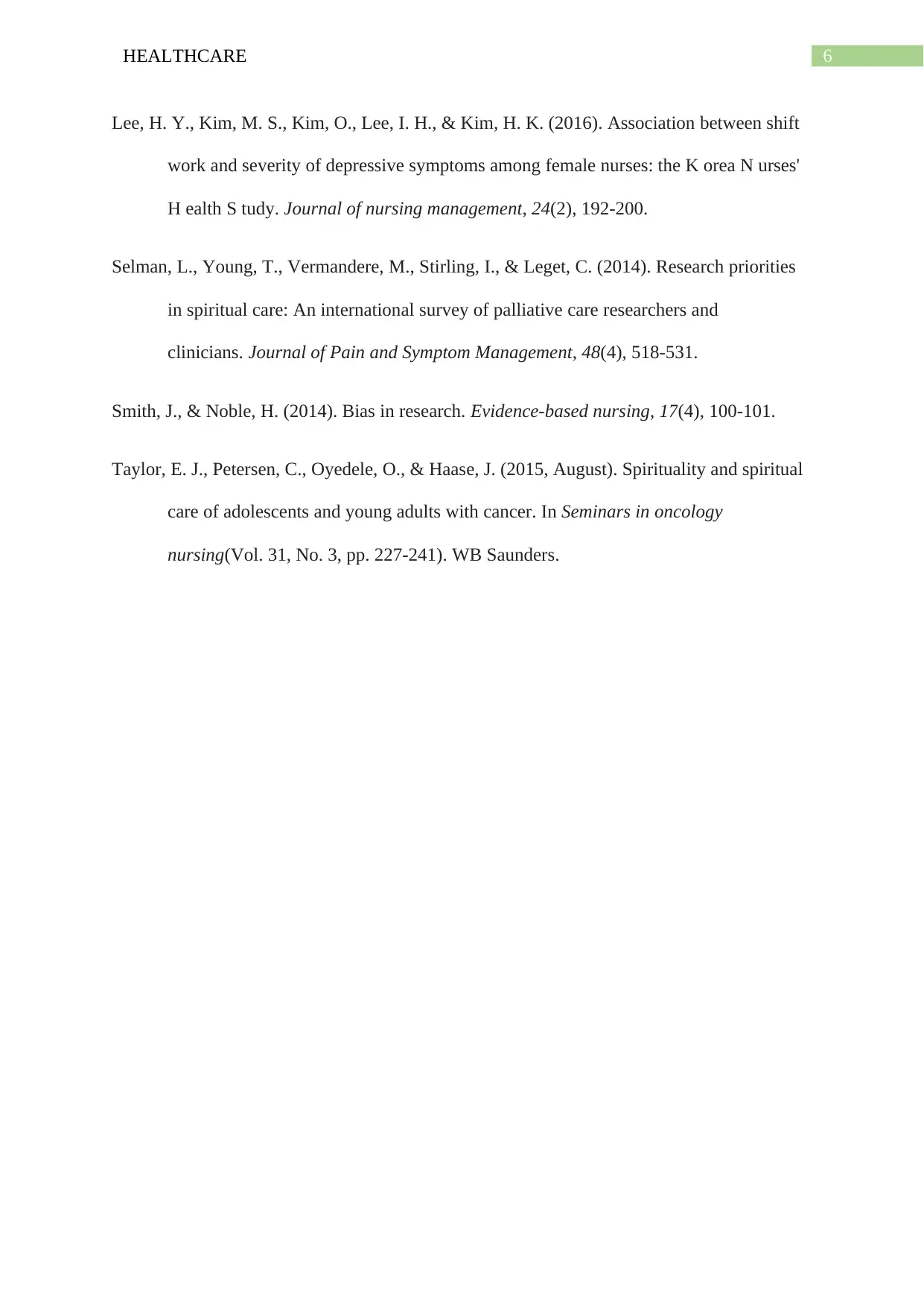
6HEALTHCARE
Lee, H. Y., Kim, M. S., Kim, O., Lee, I. H., & Kim, H. K. (2016). Association between shift
work and severity of depressive symptoms among female nurses: the K orea N urses'
H ealth S tudy. Journal of nursing management, 24(2), 192-200.
Selman, L., Young, T., Vermandere, M., Stirling, I., & Leget, C. (2014). Research priorities
in spiritual care: An international survey of palliative care researchers and
clinicians. Journal of Pain and Symptom Management, 48(4), 518-531.
Smith, J., & Noble, H. (2014). Bias in research. Evidence-based nursing, 17(4), 100-101.
Taylor, E. J., Petersen, C., Oyedele, O., & Haase, J. (2015, August). Spirituality and spiritual
care of adolescents and young adults with cancer. In Seminars in oncology
nursing(Vol. 31, No. 3, pp. 227-241). WB Saunders.
Lee, H. Y., Kim, M. S., Kim, O., Lee, I. H., & Kim, H. K. (2016). Association between shift
work and severity of depressive symptoms among female nurses: the K orea N urses'
H ealth S tudy. Journal of nursing management, 24(2), 192-200.
Selman, L., Young, T., Vermandere, M., Stirling, I., & Leget, C. (2014). Research priorities
in spiritual care: An international survey of palliative care researchers and
clinicians. Journal of Pain and Symptom Management, 48(4), 518-531.
Smith, J., & Noble, H. (2014). Bias in research. Evidence-based nursing, 17(4), 100-101.
Taylor, E. J., Petersen, C., Oyedele, O., & Haase, J. (2015, August). Spirituality and spiritual
care of adolescents and young adults with cancer. In Seminars in oncology
nursing(Vol. 31, No. 3, pp. 227-241). WB Saunders.
Paraphrase This Document
Need a fresh take? Get an instant paraphrase of this document with our AI Paraphraser

7HEALTHCARE
1 out of 8
Related Documents
Your All-in-One AI-Powered Toolkit for Academic Success.
+13062052269
info@desklib.com
Available 24*7 on WhatsApp / Email
![[object Object]](/_next/static/media/star-bottom.7253800d.svg)
Unlock your academic potential
Copyright © 2020–2026 A2Z Services. All Rights Reserved. Developed and managed by ZUCOL.





